Organisational Behaviour: Sainsbury's Culture, Politics, and Power
VerifiedAdded on 2023/01/19
|14
|4569
|78
Report
AI Summary
This report provides an in-depth analysis of organisational behaviour principles within the context of Sainsbury's, a major UK supermarket chain. It begins by examining how organisational culture, politics, and power dynamics influence individual and team behaviour and performance, utilizing the Charles Handy model and French & Raven's power concepts. The report then delves into motivational theories, comparing and contrasting content theories like Maslow's hierarchy and ERG theory with process theories such as Vroom's expectancy theory and goal-setting theory, concluding that Maslow's theory is best for Sainsbury's. The analysis also includes the definition of effective and ineffective teams, offering specific recommendations for enhancing organisational performance and employee satisfaction within Sainsbury's. The report integrates various theoretical frameworks to provide a comprehensive understanding of organisational behaviour in a real-world setting.
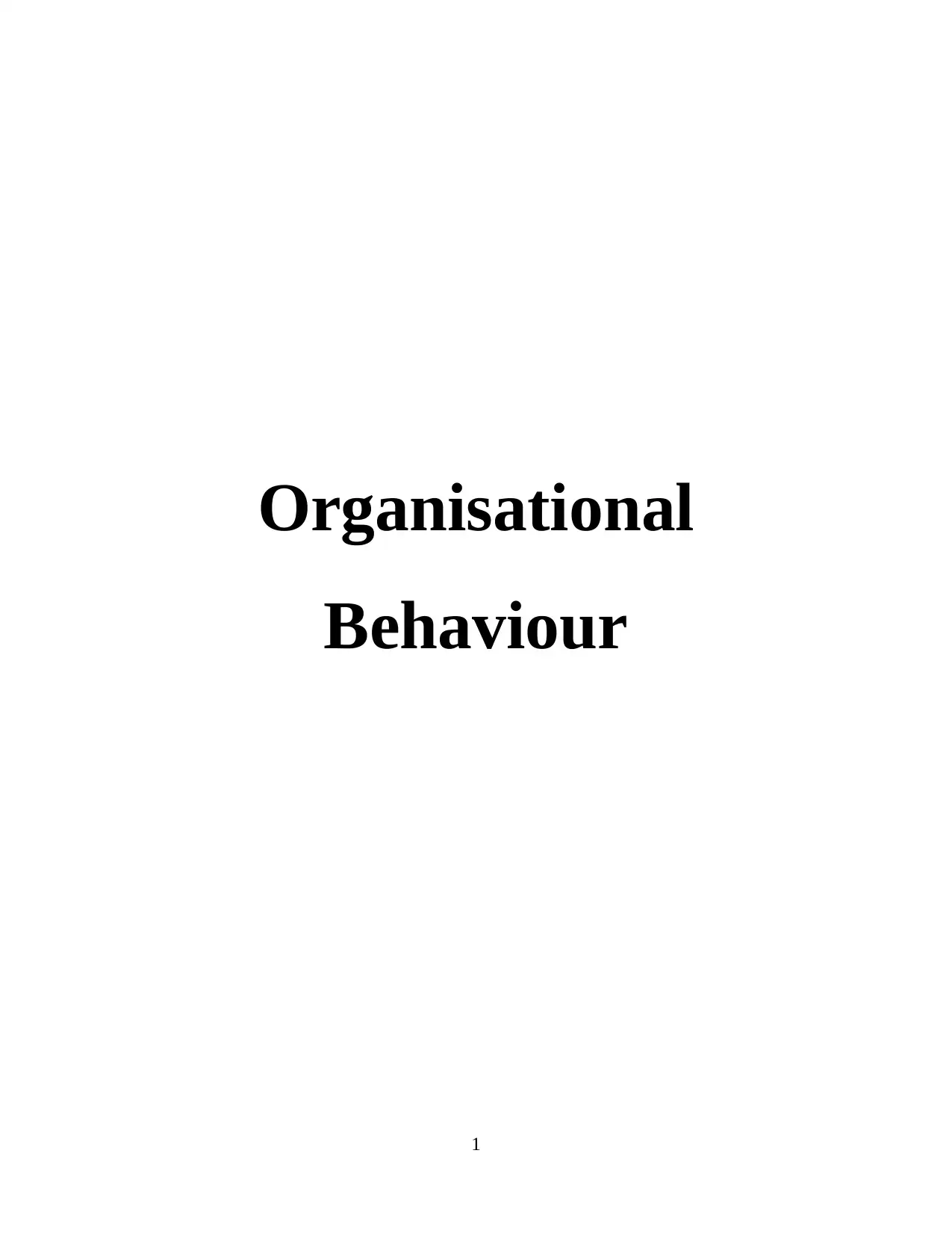
Organisational
Behaviour
1
Behaviour
1
Paraphrase This Document
Need a fresh take? Get an instant paraphrase of this document with our AI Paraphraser
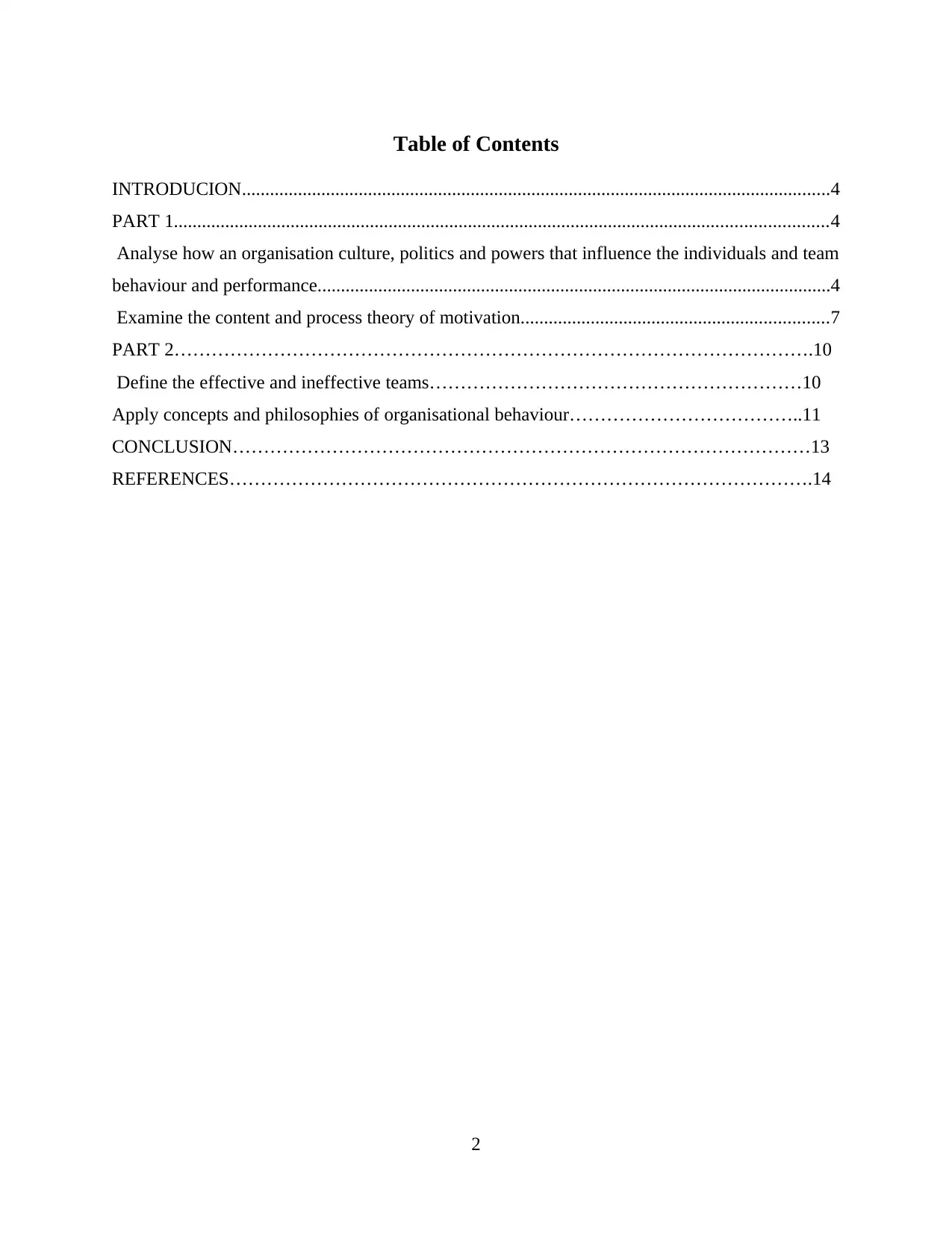
Table of Contents
INTRODUCION..............................................................................................................................4
PART 1............................................................................................................................................4
Analyse how an organisation culture, politics and powers that influence the individuals and team
behaviour and performance..............................................................................................................4
Examine the content and process theory of motivation..................................................................7
PART 2………………………………………………………………………………………….10
Define the effective and ineffective teams……………………………………………………10
Apply concepts and philosophies of organisational behaviour………………………………..11
CONCLUSION…………………………………………………………………………………13
REFERENCES………………………………………………………………………………….14
2
INTRODUCION..............................................................................................................................4
PART 1............................................................................................................................................4
Analyse how an organisation culture, politics and powers that influence the individuals and team
behaviour and performance..............................................................................................................4
Examine the content and process theory of motivation..................................................................7
PART 2………………………………………………………………………………………….10
Define the effective and ineffective teams……………………………………………………10
Apply concepts and philosophies of organisational behaviour………………………………..11
CONCLUSION…………………………………………………………………………………13
REFERENCES………………………………………………………………………………….14
2
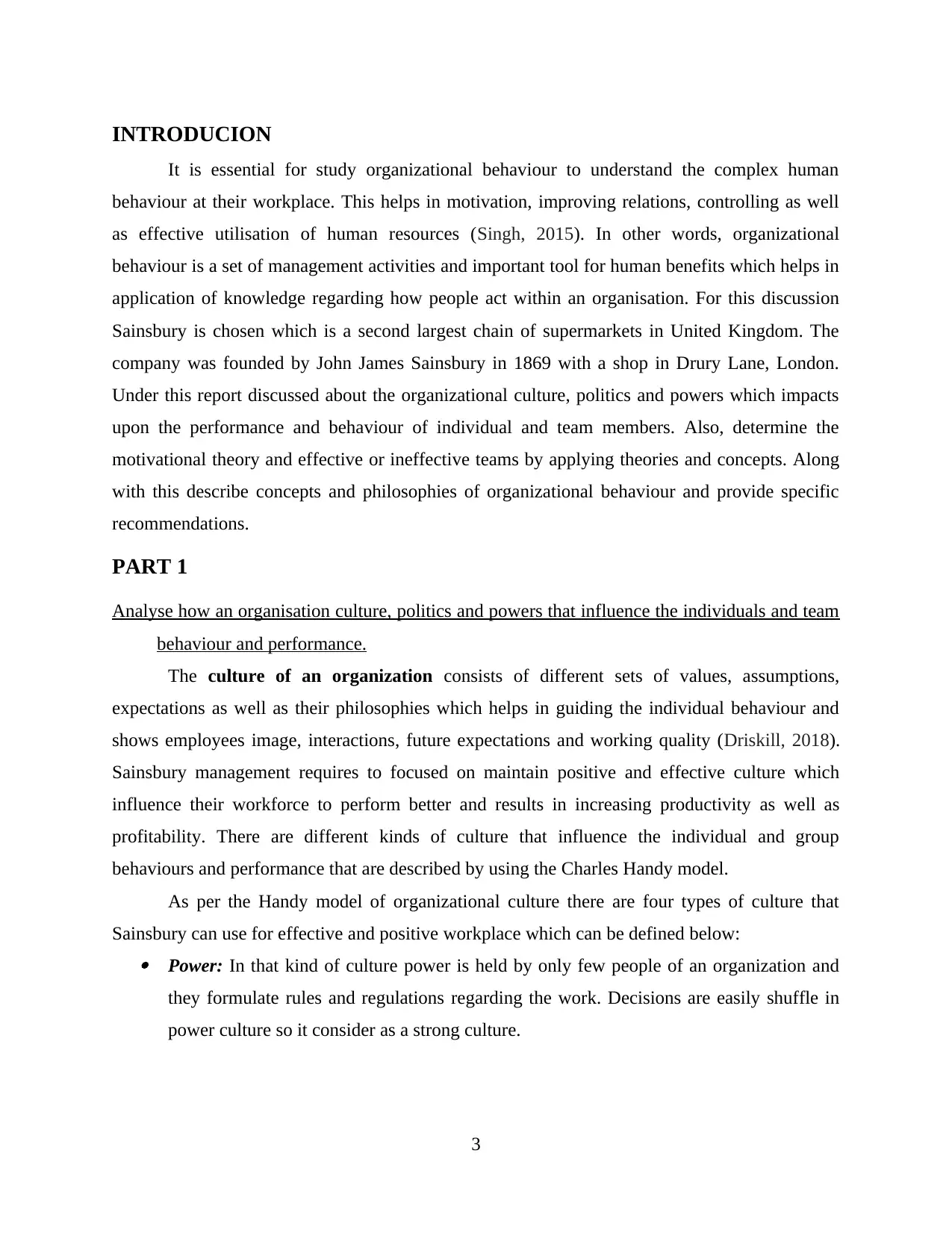
INTRODUCION
It is essential for study organizational behaviour to understand the complex human
behaviour at their workplace. This helps in motivation, improving relations, controlling as well
as effective utilisation of human resources (Singh, 2015). In other words, organizational
behaviour is a set of management activities and important tool for human benefits which helps in
application of knowledge regarding how people act within an organisation. For this discussion
Sainsbury is chosen which is a second largest chain of supermarkets in United Kingdom. The
company was founded by John James Sainsbury in 1869 with a shop in Drury Lane, London.
Under this report discussed about the organizational culture, politics and powers which impacts
upon the performance and behaviour of individual and team members. Also, determine the
motivational theory and effective or ineffective teams by applying theories and concepts. Along
with this describe concepts and philosophies of organizational behaviour and provide specific
recommendations.
PART 1
Analyse how an organisation culture, politics and powers that influence the individuals and team
behaviour and performance.
The culture of an organization consists of different sets of values, assumptions,
expectations as well as their philosophies which helps in guiding the individual behaviour and
shows employees image, interactions, future expectations and working quality (Driskill, 2018).
Sainsbury management requires to focused on maintain positive and effective culture which
influence their workforce to perform better and results in increasing productivity as well as
profitability. There are different kinds of culture that influence the individual and group
behaviours and performance that are described by using the Charles Handy model.
As per the Handy model of organizational culture there are four types of culture that
Sainsbury can use for effective and positive workplace which can be defined below: Power: In that kind of culture power is held by only few people of an organization and
they formulate rules and regulations regarding the work. Decisions are easily shuffle in
power culture so it consider as a strong culture.
3
It is essential for study organizational behaviour to understand the complex human
behaviour at their workplace. This helps in motivation, improving relations, controlling as well
as effective utilisation of human resources (Singh, 2015). In other words, organizational
behaviour is a set of management activities and important tool for human benefits which helps in
application of knowledge regarding how people act within an organisation. For this discussion
Sainsbury is chosen which is a second largest chain of supermarkets in United Kingdom. The
company was founded by John James Sainsbury in 1869 with a shop in Drury Lane, London.
Under this report discussed about the organizational culture, politics and powers which impacts
upon the performance and behaviour of individual and team members. Also, determine the
motivational theory and effective or ineffective teams by applying theories and concepts. Along
with this describe concepts and philosophies of organizational behaviour and provide specific
recommendations.
PART 1
Analyse how an organisation culture, politics and powers that influence the individuals and team
behaviour and performance.
The culture of an organization consists of different sets of values, assumptions,
expectations as well as their philosophies which helps in guiding the individual behaviour and
shows employees image, interactions, future expectations and working quality (Driskill, 2018).
Sainsbury management requires to focused on maintain positive and effective culture which
influence their workforce to perform better and results in increasing productivity as well as
profitability. There are different kinds of culture that influence the individual and group
behaviours and performance that are described by using the Charles Handy model.
As per the Handy model of organizational culture there are four types of culture that
Sainsbury can use for effective and positive workplace which can be defined below: Power: In that kind of culture power is held by only few people of an organization and
they formulate rules and regulations regarding the work. Decisions are easily shuffle in
power culture so it consider as a strong culture.
3
⊘ This is a preview!⊘
Do you want full access?
Subscribe today to unlock all pages.

Trusted by 1+ million students worldwide
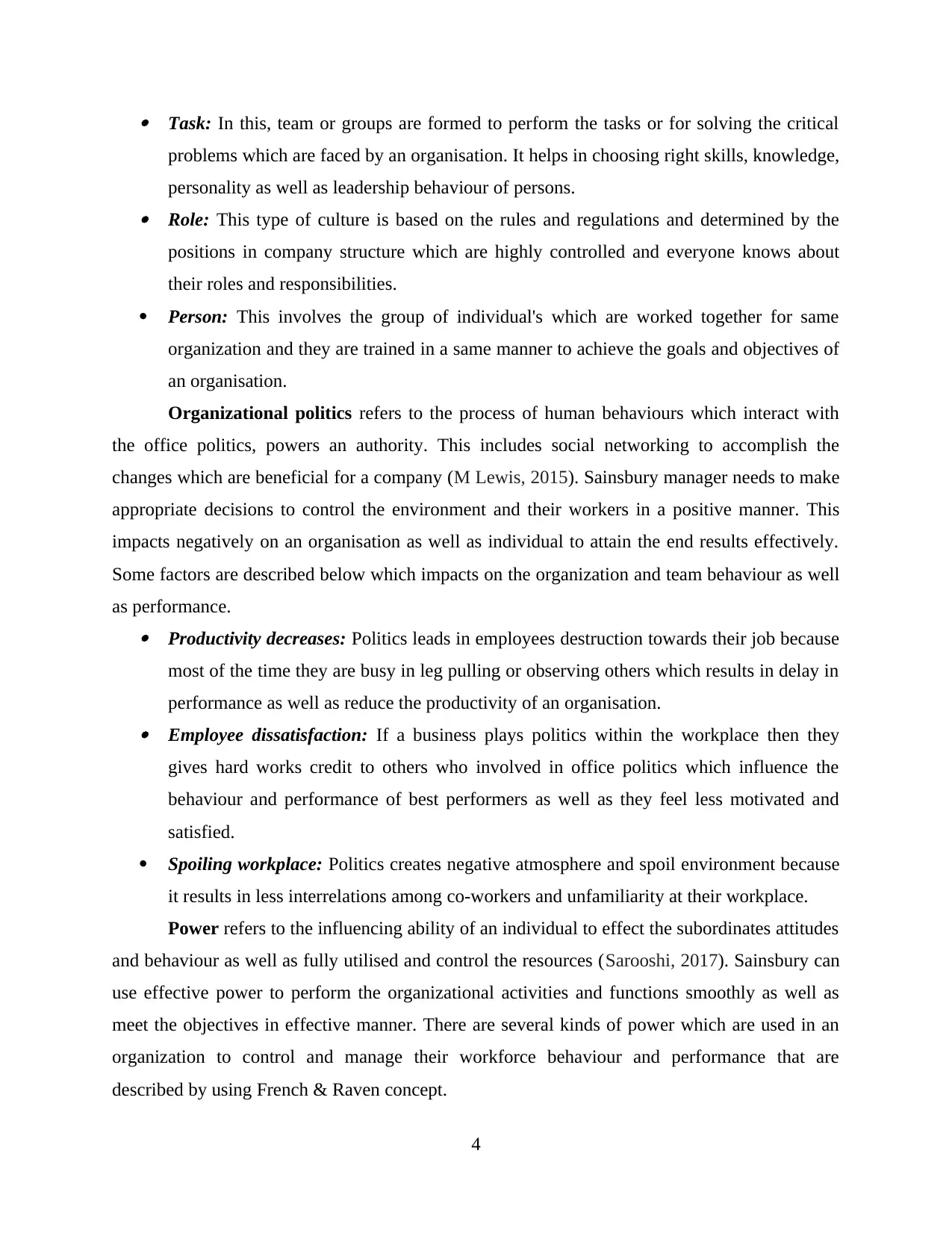
Task: In this, team or groups are formed to perform the tasks or for solving the critical
problems which are faced by an organisation. It helps in choosing right skills, knowledge,
personality as well as leadership behaviour of persons. Role: This type of culture is based on the rules and regulations and determined by the
positions in company structure which are highly controlled and everyone knows about
their roles and responsibilities.
Person: This involves the group of individual's which are worked together for same
organization and they are trained in a same manner to achieve the goals and objectives of
an organisation.
Organizational politics refers to the process of human behaviours which interact with
the office politics, powers an authority. This includes social networking to accomplish the
changes which are beneficial for a company (M Lewis, 2015). Sainsbury manager needs to make
appropriate decisions to control the environment and their workers in a positive manner. This
impacts negatively on an organisation as well as individual to attain the end results effectively.
Some factors are described below which impacts on the organization and team behaviour as well
as performance. Productivity decreases: Politics leads in employees destruction towards their job because
most of the time they are busy in leg pulling or observing others which results in delay in
performance as well as reduce the productivity of an organisation. Employee dissatisfaction: If a business plays politics within the workplace then they
gives hard works credit to others who involved in office politics which influence the
behaviour and performance of best performers as well as they feel less motivated and
satisfied.
Spoiling workplace: Politics creates negative atmosphere and spoil environment because
it results in less interrelations among co-workers and unfamiliarity at their workplace.
Power refers to the influencing ability of an individual to effect the subordinates attitudes
and behaviour as well as fully utilised and control the resources (Sarooshi, 2017). Sainsbury can
use effective power to perform the organizational activities and functions smoothly as well as
meet the objectives in effective manner. There are several kinds of power which are used in an
organization to control and manage their workforce behaviour and performance that are
described by using French & Raven concept.
4
problems which are faced by an organisation. It helps in choosing right skills, knowledge,
personality as well as leadership behaviour of persons. Role: This type of culture is based on the rules and regulations and determined by the
positions in company structure which are highly controlled and everyone knows about
their roles and responsibilities.
Person: This involves the group of individual's which are worked together for same
organization and they are trained in a same manner to achieve the goals and objectives of
an organisation.
Organizational politics refers to the process of human behaviours which interact with
the office politics, powers an authority. This includes social networking to accomplish the
changes which are beneficial for a company (M Lewis, 2015). Sainsbury manager needs to make
appropriate decisions to control the environment and their workers in a positive manner. This
impacts negatively on an organisation as well as individual to attain the end results effectively.
Some factors are described below which impacts on the organization and team behaviour as well
as performance. Productivity decreases: Politics leads in employees destruction towards their job because
most of the time they are busy in leg pulling or observing others which results in delay in
performance as well as reduce the productivity of an organisation. Employee dissatisfaction: If a business plays politics within the workplace then they
gives hard works credit to others who involved in office politics which influence the
behaviour and performance of best performers as well as they feel less motivated and
satisfied.
Spoiling workplace: Politics creates negative atmosphere and spoil environment because
it results in less interrelations among co-workers and unfamiliarity at their workplace.
Power refers to the influencing ability of an individual to effect the subordinates attitudes
and behaviour as well as fully utilised and control the resources (Sarooshi, 2017). Sainsbury can
use effective power to perform the organizational activities and functions smoothly as well as
meet the objectives in effective manner. There are several kinds of power which are used in an
organization to control and manage their workforce behaviour and performance that are
described by using French & Raven concept.
4
Paraphrase This Document
Need a fresh take? Get an instant paraphrase of this document with our AI Paraphraser
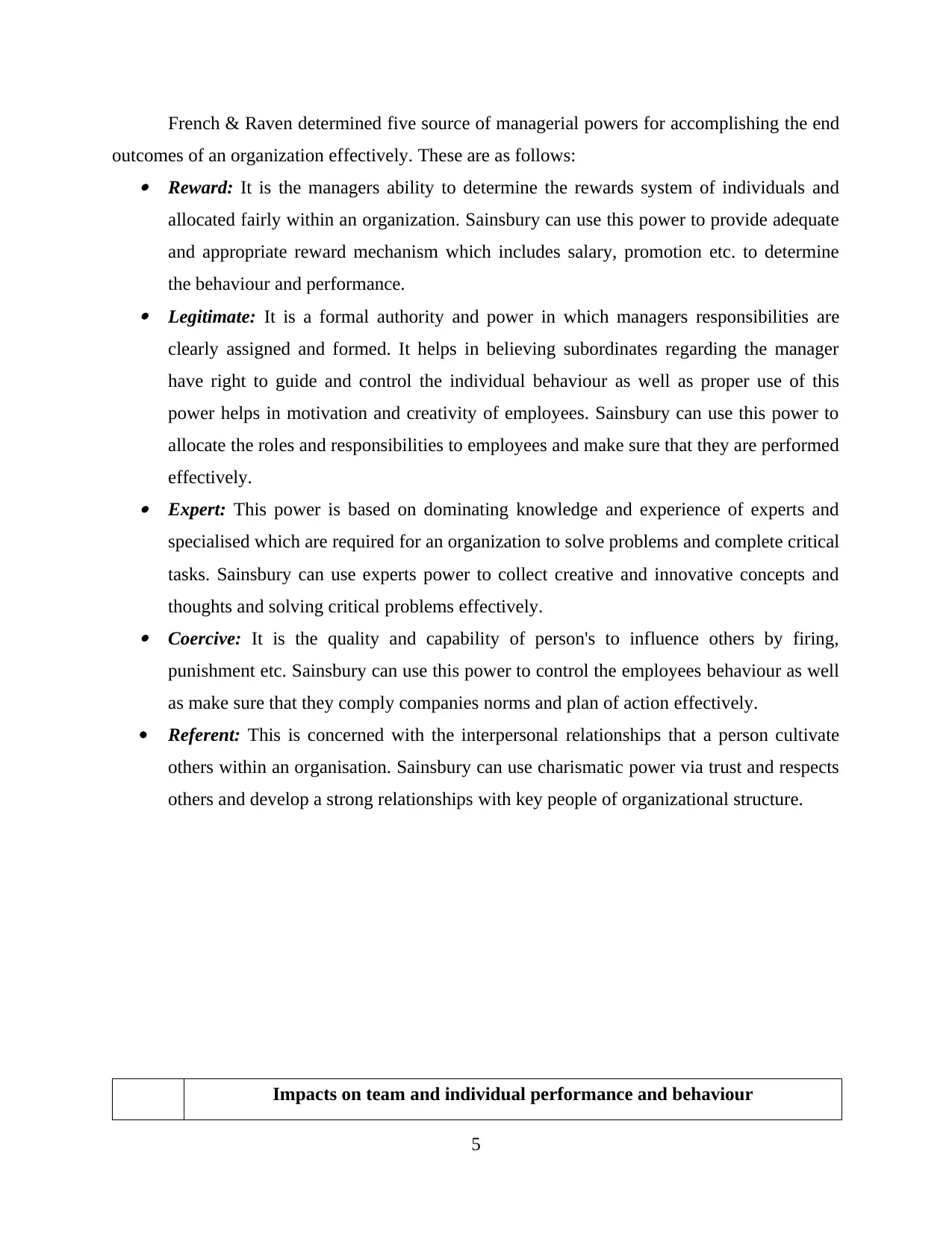
French & Raven determined five source of managerial powers for accomplishing the end
outcomes of an organization effectively. These are as follows: Reward: It is the managers ability to determine the rewards system of individuals and
allocated fairly within an organization. Sainsbury can use this power to provide adequate
and appropriate reward mechanism which includes salary, promotion etc. to determine
the behaviour and performance. Legitimate: It is a formal authority and power in which managers responsibilities are
clearly assigned and formed. It helps in believing subordinates regarding the manager
have right to guide and control the individual behaviour as well as proper use of this
power helps in motivation and creativity of employees. Sainsbury can use this power to
allocate the roles and responsibilities to employees and make sure that they are performed
effectively. Expert: This power is based on dominating knowledge and experience of experts and
specialised which are required for an organization to solve problems and complete critical
tasks. Sainsbury can use experts power to collect creative and innovative concepts and
thoughts and solving critical problems effectively. Coercive: It is the quality and capability of person's to influence others by firing,
punishment etc. Sainsbury can use this power to control the employees behaviour as well
as make sure that they comply companies norms and plan of action effectively.
Referent: This is concerned with the interpersonal relationships that a person cultivate
others within an organisation. Sainsbury can use charismatic power via trust and respects
others and develop a strong relationships with key people of organizational structure.
Impacts on team and individual performance and behaviour
5
outcomes of an organization effectively. These are as follows: Reward: It is the managers ability to determine the rewards system of individuals and
allocated fairly within an organization. Sainsbury can use this power to provide adequate
and appropriate reward mechanism which includes salary, promotion etc. to determine
the behaviour and performance. Legitimate: It is a formal authority and power in which managers responsibilities are
clearly assigned and formed. It helps in believing subordinates regarding the manager
have right to guide and control the individual behaviour as well as proper use of this
power helps in motivation and creativity of employees. Sainsbury can use this power to
allocate the roles and responsibilities to employees and make sure that they are performed
effectively. Expert: This power is based on dominating knowledge and experience of experts and
specialised which are required for an organization to solve problems and complete critical
tasks. Sainsbury can use experts power to collect creative and innovative concepts and
thoughts and solving critical problems effectively. Coercive: It is the quality and capability of person's to influence others by firing,
punishment etc. Sainsbury can use this power to control the employees behaviour as well
as make sure that they comply companies norms and plan of action effectively.
Referent: This is concerned with the interpersonal relationships that a person cultivate
others within an organisation. Sainsbury can use charismatic power via trust and respects
others and develop a strong relationships with key people of organizational structure.
Impacts on team and individual performance and behaviour
5
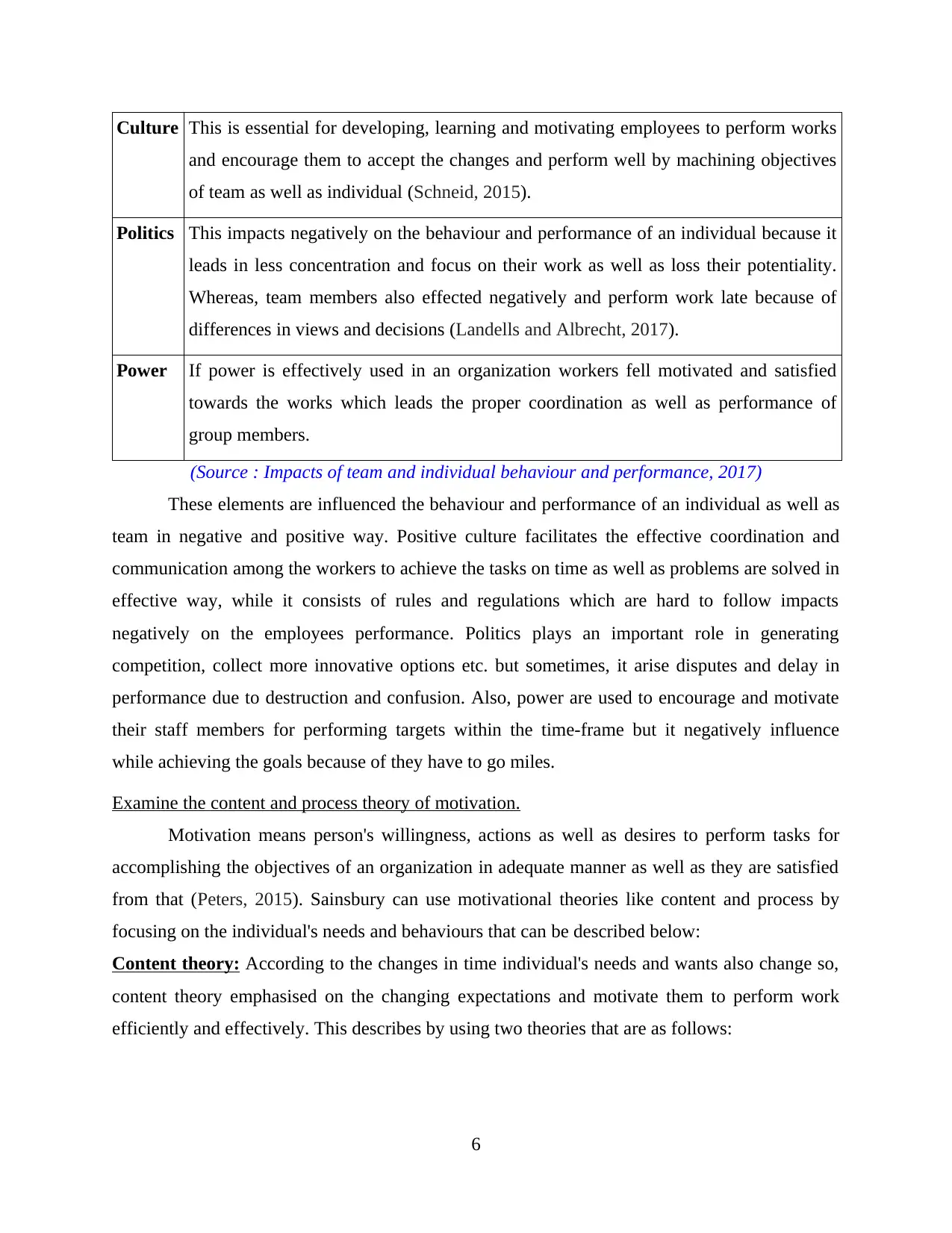
Culture This is essential for developing, learning and motivating employees to perform works
and encourage them to accept the changes and perform well by machining objectives
of team as well as individual (Schneid, 2015).
Politics This impacts negatively on the behaviour and performance of an individual because it
leads in less concentration and focus on their work as well as loss their potentiality.
Whereas, team members also effected negatively and perform work late because of
differences in views and decisions (Landells and Albrecht, 2017).
Power If power is effectively used in an organization workers fell motivated and satisfied
towards the works which leads the proper coordination as well as performance of
group members.
(Source : Impacts of team and individual behaviour and performance, 2017)
These elements are influenced the behaviour and performance of an individual as well as
team in negative and positive way. Positive culture facilitates the effective coordination and
communication among the workers to achieve the tasks on time as well as problems are solved in
effective way, while it consists of rules and regulations which are hard to follow impacts
negatively on the employees performance. Politics plays an important role in generating
competition, collect more innovative options etc. but sometimes, it arise disputes and delay in
performance due to destruction and confusion. Also, power are used to encourage and motivate
their staff members for performing targets within the time-frame but it negatively influence
while achieving the goals because of they have to go miles.
Examine the content and process theory of motivation.
Motivation means person's willingness, actions as well as desires to perform tasks for
accomplishing the objectives of an organization in adequate manner as well as they are satisfied
from that (Peters, 2015). Sainsbury can use motivational theories like content and process by
focusing on the individual's needs and behaviours that can be described below:
Content theory: According to the changes in time individual's needs and wants also change so,
content theory emphasised on the changing expectations and motivate them to perform work
efficiently and effectively. This describes by using two theories that are as follows:
6
and encourage them to accept the changes and perform well by machining objectives
of team as well as individual (Schneid, 2015).
Politics This impacts negatively on the behaviour and performance of an individual because it
leads in less concentration and focus on their work as well as loss their potentiality.
Whereas, team members also effected negatively and perform work late because of
differences in views and decisions (Landells and Albrecht, 2017).
Power If power is effectively used in an organization workers fell motivated and satisfied
towards the works which leads the proper coordination as well as performance of
group members.
(Source : Impacts of team and individual behaviour and performance, 2017)
These elements are influenced the behaviour and performance of an individual as well as
team in negative and positive way. Positive culture facilitates the effective coordination and
communication among the workers to achieve the tasks on time as well as problems are solved in
effective way, while it consists of rules and regulations which are hard to follow impacts
negatively on the employees performance. Politics plays an important role in generating
competition, collect more innovative options etc. but sometimes, it arise disputes and delay in
performance due to destruction and confusion. Also, power are used to encourage and motivate
their staff members for performing targets within the time-frame but it negatively influence
while achieving the goals because of they have to go miles.
Examine the content and process theory of motivation.
Motivation means person's willingness, actions as well as desires to perform tasks for
accomplishing the objectives of an organization in adequate manner as well as they are satisfied
from that (Peters, 2015). Sainsbury can use motivational theories like content and process by
focusing on the individual's needs and behaviours that can be described below:
Content theory: According to the changes in time individual's needs and wants also change so,
content theory emphasised on the changing expectations and motivate them to perform work
efficiently and effectively. This describes by using two theories that are as follows:
6
⊘ This is a preview!⊘
Do you want full access?
Subscribe today to unlock all pages.

Trusted by 1+ million students worldwide
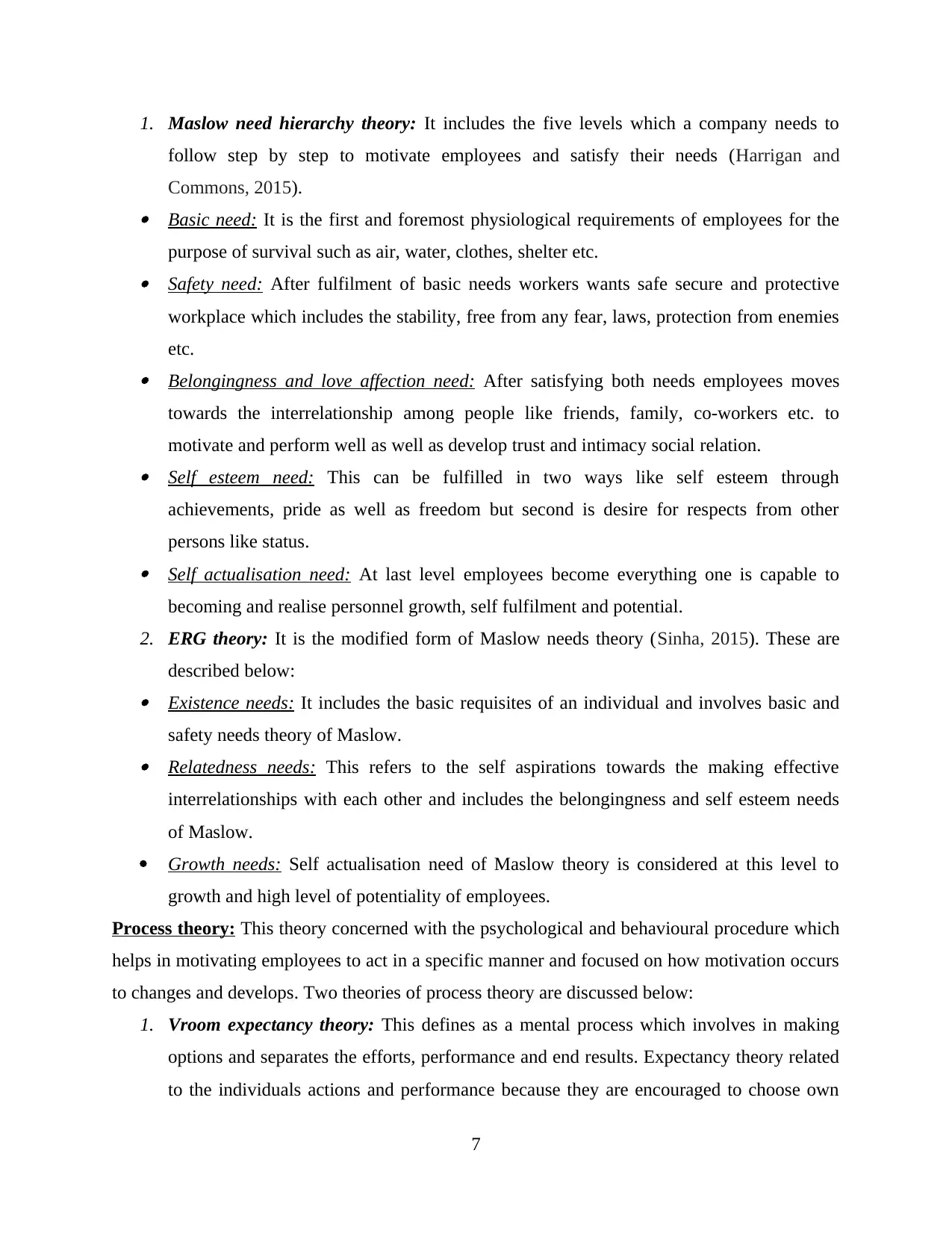
1. Maslow need hierarchy theory: It includes the five levels which a company needs to
follow step by step to motivate employees and satisfy their needs (Harrigan and
Commons, 2015). Basic need: It is the first and foremost physiological requirements of employees for the
purpose of survival such as air, water, clothes, shelter etc. Safety need: After fulfilment of basic needs workers wants safe secure and protective
workplace which includes the stability, free from any fear, laws, protection from enemies
etc. Belongingness and love affection need: After satisfying both needs employees moves
towards the interrelationship among people like friends, family, co-workers etc. to
motivate and perform well as well as develop trust and intimacy social relation. Self esteem need: This can be fulfilled in two ways like self esteem through
achievements, pride as well as freedom but second is desire for respects from other
persons like status. Self actualisation need: At last level employees become everything one is capable to
becoming and realise personnel growth, self fulfilment and potential.
2. ERG theory: It is the modified form of Maslow needs theory (Sinha, 2015). These are
described below: Existence needs: It includes the basic requisites of an individual and involves basic and
safety needs theory of Maslow. Relatedness needs: This refers to the self aspirations towards the making effective
interrelationships with each other and includes the belongingness and self esteem needs
of Maslow.
Growth needs: Self actualisation need of Maslow theory is considered at this level to
growth and high level of potentiality of employees.
Process theory: This theory concerned with the psychological and behavioural procedure which
helps in motivating employees to act in a specific manner and focused on how motivation occurs
to changes and develops. Two theories of process theory are discussed below:
1. Vroom expectancy theory: This defines as a mental process which involves in making
options and separates the efforts, performance and end results. Expectancy theory related
to the individuals actions and performance because they are encouraged to choose own
7
follow step by step to motivate employees and satisfy their needs (Harrigan and
Commons, 2015). Basic need: It is the first and foremost physiological requirements of employees for the
purpose of survival such as air, water, clothes, shelter etc. Safety need: After fulfilment of basic needs workers wants safe secure and protective
workplace which includes the stability, free from any fear, laws, protection from enemies
etc. Belongingness and love affection need: After satisfying both needs employees moves
towards the interrelationship among people like friends, family, co-workers etc. to
motivate and perform well as well as develop trust and intimacy social relation. Self esteem need: This can be fulfilled in two ways like self esteem through
achievements, pride as well as freedom but second is desire for respects from other
persons like status. Self actualisation need: At last level employees become everything one is capable to
becoming and realise personnel growth, self fulfilment and potential.
2. ERG theory: It is the modified form of Maslow needs theory (Sinha, 2015). These are
described below: Existence needs: It includes the basic requisites of an individual and involves basic and
safety needs theory of Maslow. Relatedness needs: This refers to the self aspirations towards the making effective
interrelationships with each other and includes the belongingness and self esteem needs
of Maslow.
Growth needs: Self actualisation need of Maslow theory is considered at this level to
growth and high level of potentiality of employees.
Process theory: This theory concerned with the psychological and behavioural procedure which
helps in motivating employees to act in a specific manner and focused on how motivation occurs
to changes and develops. Two theories of process theory are discussed below:
1. Vroom expectancy theory: This defines as a mental process which involves in making
options and separates the efforts, performance and end results. Expectancy theory related
to the individuals actions and performance because they are encouraged to choose own
7
Paraphrase This Document
Need a fresh take? Get an instant paraphrase of this document with our AI Paraphraser
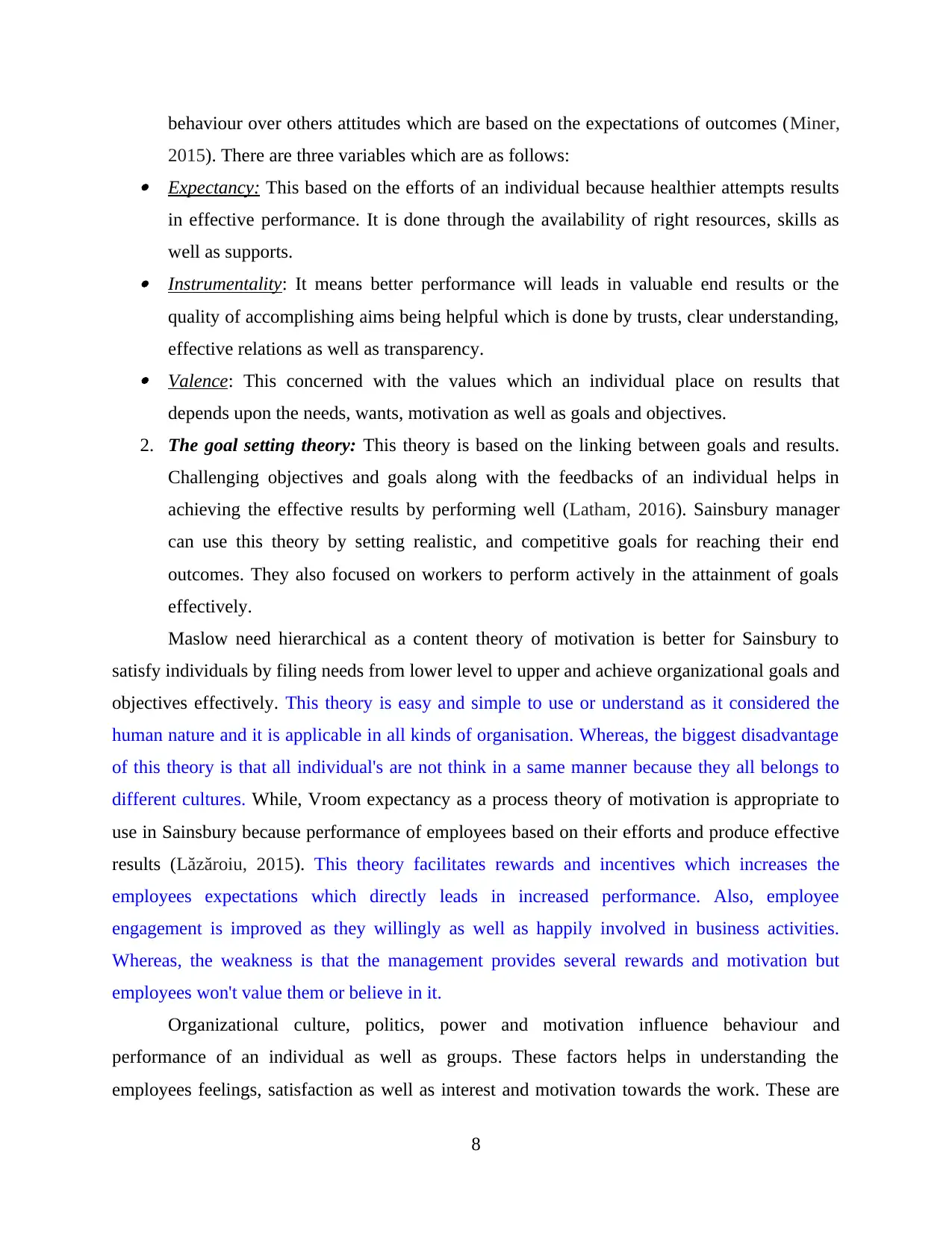
behaviour over others attitudes which are based on the expectations of outcomes (Miner,
2015). There are three variables which are as follows: Expectancy: This based on the efforts of an individual because healthier attempts results
in effective performance. It is done through the availability of right resources, skills as
well as supports. Instrumentality: It means better performance will leads in valuable end results or the
quality of accomplishing aims being helpful which is done by trusts, clear understanding,
effective relations as well as transparency. Valence: This concerned with the values which an individual place on results that
depends upon the needs, wants, motivation as well as goals and objectives.
2. The goal setting theory: This theory is based on the linking between goals and results.
Challenging objectives and goals along with the feedbacks of an individual helps in
achieving the effective results by performing well (Latham, 2016). Sainsbury manager
can use this theory by setting realistic, and competitive goals for reaching their end
outcomes. They also focused on workers to perform actively in the attainment of goals
effectively.
Maslow need hierarchical as a content theory of motivation is better for Sainsbury to
satisfy individuals by filing needs from lower level to upper and achieve organizational goals and
objectives effectively. This theory is easy and simple to use or understand as it considered the
human nature and it is applicable in all kinds of organisation. Whereas, the biggest disadvantage
of this theory is that all individual's are not think in a same manner because they all belongs to
different cultures. While, Vroom expectancy as a process theory of motivation is appropriate to
use in Sainsbury because performance of employees based on their efforts and produce effective
results (Lăzăroiu, 2015). This theory facilitates rewards and incentives which increases the
employees expectations which directly leads in increased performance. Also, employee
engagement is improved as they willingly as well as happily involved in business activities.
Whereas, the weakness is that the management provides several rewards and motivation but
employees won't value them or believe in it.
Organizational culture, politics, power and motivation influence behaviour and
performance of an individual as well as groups. These factors helps in understanding the
employees feelings, satisfaction as well as interest and motivation towards the work. These are
8
2015). There are three variables which are as follows: Expectancy: This based on the efforts of an individual because healthier attempts results
in effective performance. It is done through the availability of right resources, skills as
well as supports. Instrumentality: It means better performance will leads in valuable end results or the
quality of accomplishing aims being helpful which is done by trusts, clear understanding,
effective relations as well as transparency. Valence: This concerned with the values which an individual place on results that
depends upon the needs, wants, motivation as well as goals and objectives.
2. The goal setting theory: This theory is based on the linking between goals and results.
Challenging objectives and goals along with the feedbacks of an individual helps in
achieving the effective results by performing well (Latham, 2016). Sainsbury manager
can use this theory by setting realistic, and competitive goals for reaching their end
outcomes. They also focused on workers to perform actively in the attainment of goals
effectively.
Maslow need hierarchical as a content theory of motivation is better for Sainsbury to
satisfy individuals by filing needs from lower level to upper and achieve organizational goals and
objectives effectively. This theory is easy and simple to use or understand as it considered the
human nature and it is applicable in all kinds of organisation. Whereas, the biggest disadvantage
of this theory is that all individual's are not think in a same manner because they all belongs to
different cultures. While, Vroom expectancy as a process theory of motivation is appropriate to
use in Sainsbury because performance of employees based on their efforts and produce effective
results (Lăzăroiu, 2015). This theory facilitates rewards and incentives which increases the
employees expectations which directly leads in increased performance. Also, employee
engagement is improved as they willingly as well as happily involved in business activities.
Whereas, the weakness is that the management provides several rewards and motivation but
employees won't value them or believe in it.
Organizational culture, politics, power and motivation influence behaviour and
performance of an individual as well as groups. These factors helps in understanding the
employees feelings, satisfaction as well as interest and motivation towards the work. These are
8
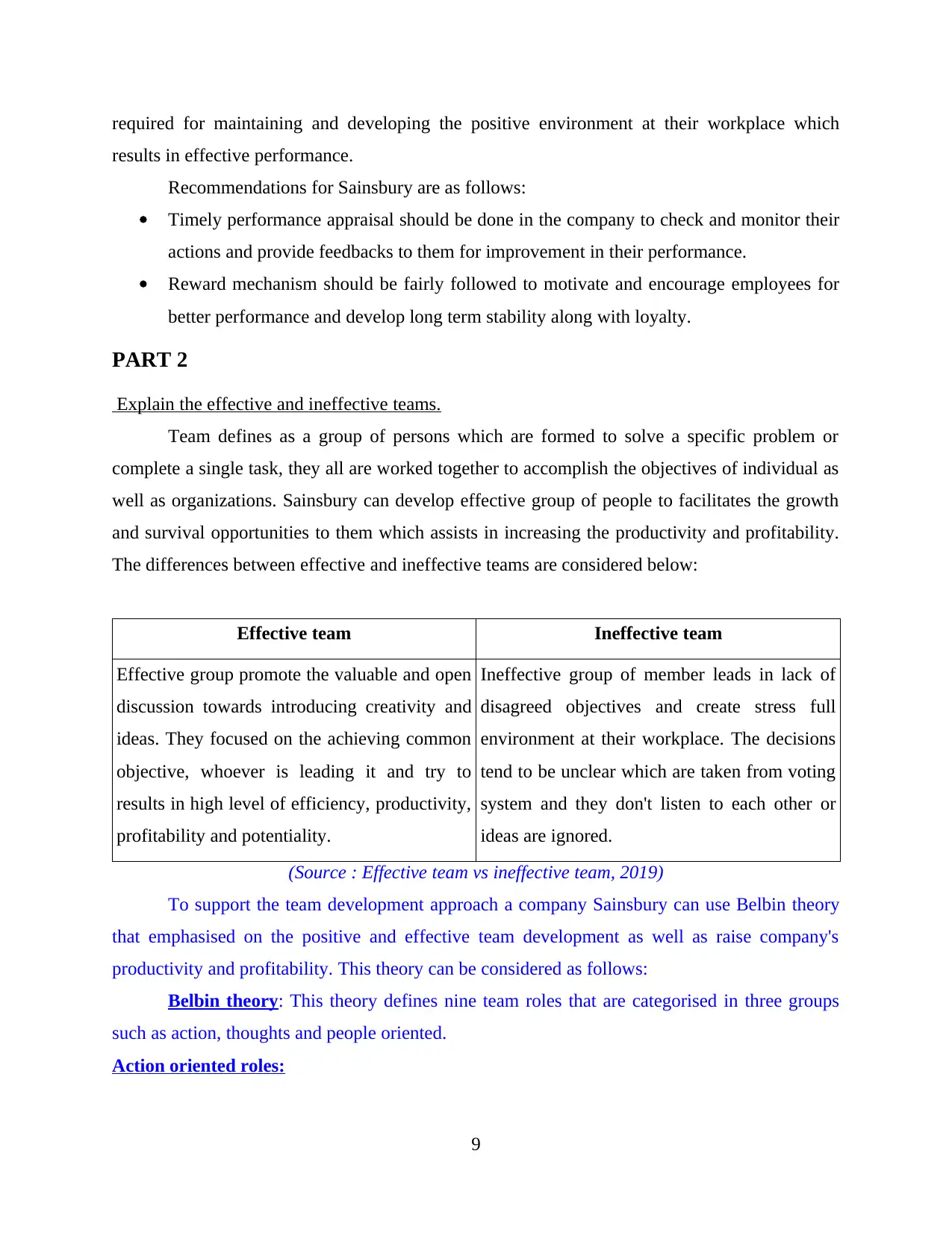
required for maintaining and developing the positive environment at their workplace which
results in effective performance.
Recommendations for Sainsbury are as follows:
Timely performance appraisal should be done in the company to check and monitor their
actions and provide feedbacks to them for improvement in their performance.
Reward mechanism should be fairly followed to motivate and encourage employees for
better performance and develop long term stability along with loyalty.
PART 2
Explain the effective and ineffective teams.
Team defines as a group of persons which are formed to solve a specific problem or
complete a single task, they all are worked together to accomplish the objectives of individual as
well as organizations. Sainsbury can develop effective group of people to facilitates the growth
and survival opportunities to them which assists in increasing the productivity and profitability.
The differences between effective and ineffective teams are considered below:
Effective team Ineffective team
Effective group promote the valuable and open
discussion towards introducing creativity and
ideas. They focused on the achieving common
objective, whoever is leading it and try to
results in high level of efficiency, productivity,
profitability and potentiality.
Ineffective group of member leads in lack of
disagreed objectives and create stress full
environment at their workplace. The decisions
tend to be unclear which are taken from voting
system and they don't listen to each other or
ideas are ignored.
(Source : Effective team vs ineffective team, 2019)
To support the team development approach a company Sainsbury can use Belbin theory
that emphasised on the positive and effective team development as well as raise company's
productivity and profitability. This theory can be considered as follows:
Belbin theory: This theory defines nine team roles that are categorised in three groups
such as action, thoughts and people oriented.
Action oriented roles:
9
results in effective performance.
Recommendations for Sainsbury are as follows:
Timely performance appraisal should be done in the company to check and monitor their
actions and provide feedbacks to them for improvement in their performance.
Reward mechanism should be fairly followed to motivate and encourage employees for
better performance and develop long term stability along with loyalty.
PART 2
Explain the effective and ineffective teams.
Team defines as a group of persons which are formed to solve a specific problem or
complete a single task, they all are worked together to accomplish the objectives of individual as
well as organizations. Sainsbury can develop effective group of people to facilitates the growth
and survival opportunities to them which assists in increasing the productivity and profitability.
The differences between effective and ineffective teams are considered below:
Effective team Ineffective team
Effective group promote the valuable and open
discussion towards introducing creativity and
ideas. They focused on the achieving common
objective, whoever is leading it and try to
results in high level of efficiency, productivity,
profitability and potentiality.
Ineffective group of member leads in lack of
disagreed objectives and create stress full
environment at their workplace. The decisions
tend to be unclear which are taken from voting
system and they don't listen to each other or
ideas are ignored.
(Source : Effective team vs ineffective team, 2019)
To support the team development approach a company Sainsbury can use Belbin theory
that emphasised on the positive and effective team development as well as raise company's
productivity and profitability. This theory can be considered as follows:
Belbin theory: This theory defines nine team roles that are categorised in three groups
such as action, thoughts and people oriented.
Action oriented roles:
9
⊘ This is a preview!⊘
Do you want full access?
Subscribe today to unlock all pages.

Trusted by 1+ million students worldwide
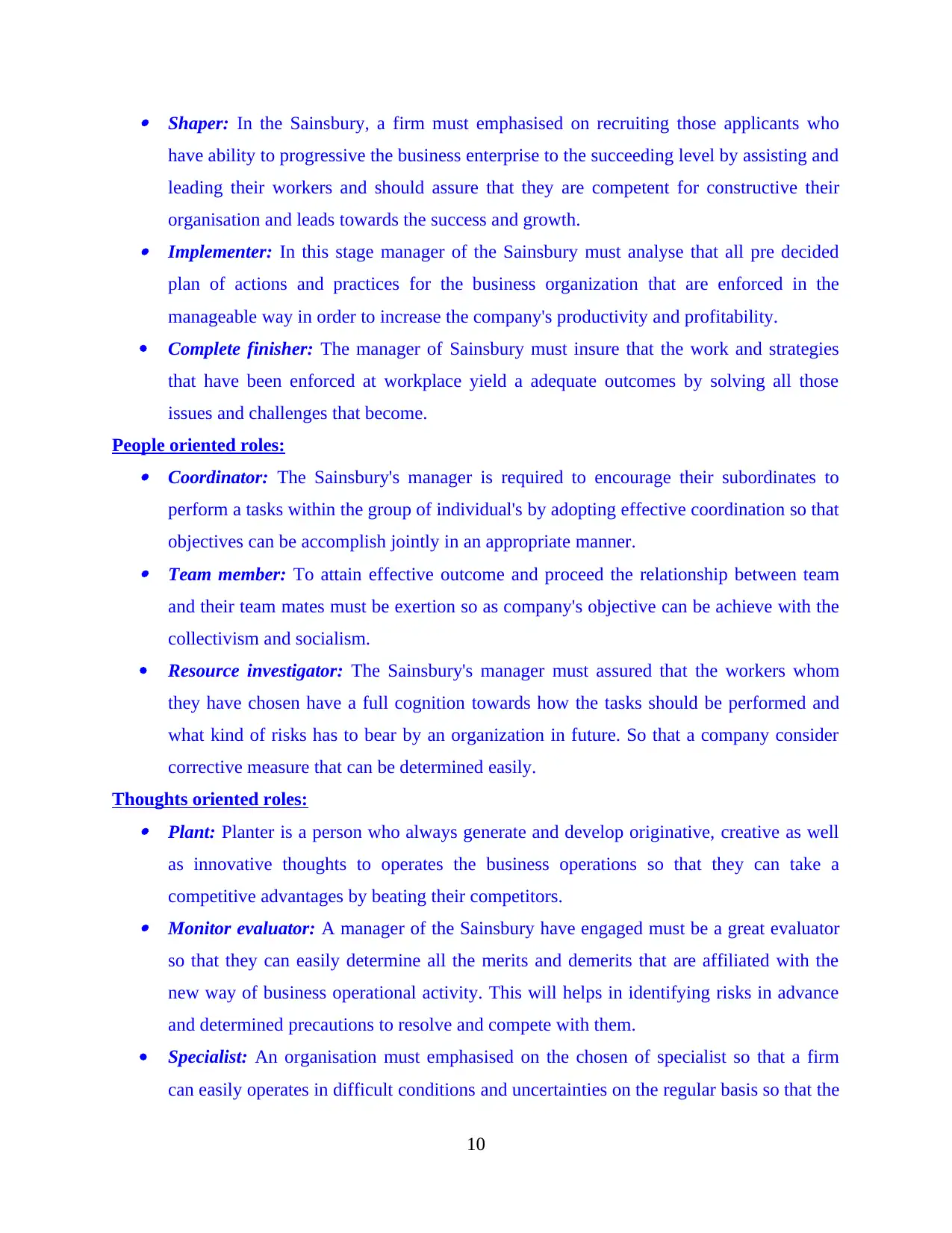
Shaper: In the Sainsbury, a firm must emphasised on recruiting those applicants who
have ability to progressive the business enterprise to the succeeding level by assisting and
leading their workers and should assure that they are competent for constructive their
organisation and leads towards the success and growth. Implementer: In this stage manager of the Sainsbury must analyse that all pre decided
plan of actions and practices for the business organization that are enforced in the
manageable way in order to increase the company's productivity and profitability.
Complete finisher: The manager of Sainsbury must insure that the work and strategies
that have been enforced at workplace yield a adequate outcomes by solving all those
issues and challenges that become.
People oriented roles: Coordinator: The Sainsbury's manager is required to encourage their subordinates to
perform a tasks within the group of individual's by adopting effective coordination so that
objectives can be accomplish jointly in an appropriate manner. Team member: To attain effective outcome and proceed the relationship between team
and their team mates must be exertion so as company's objective can be achieve with the
collectivism and socialism.
Resource investigator: The Sainsbury's manager must assured that the workers whom
they have chosen have a full cognition towards how the tasks should be performed and
what kind of risks has to bear by an organization in future. So that a company consider
corrective measure that can be determined easily.
Thoughts oriented roles: Plant: Planter is a person who always generate and develop originative, creative as well
as innovative thoughts to operates the business operations so that they can take a
competitive advantages by beating their competitors. Monitor evaluator: A manager of the Sainsbury have engaged must be a great evaluator
so that they can easily determine all the merits and demerits that are affiliated with the
new way of business operational activity. This will helps in identifying risks in advance
and determined precautions to resolve and compete with them.
Specialist: An organisation must emphasised on the chosen of specialist so that a firm
can easily operates in difficult conditions and uncertainties on the regular basis so that the
10
have ability to progressive the business enterprise to the succeeding level by assisting and
leading their workers and should assure that they are competent for constructive their
organisation and leads towards the success and growth. Implementer: In this stage manager of the Sainsbury must analyse that all pre decided
plan of actions and practices for the business organization that are enforced in the
manageable way in order to increase the company's productivity and profitability.
Complete finisher: The manager of Sainsbury must insure that the work and strategies
that have been enforced at workplace yield a adequate outcomes by solving all those
issues and challenges that become.
People oriented roles: Coordinator: The Sainsbury's manager is required to encourage their subordinates to
perform a tasks within the group of individual's by adopting effective coordination so that
objectives can be accomplish jointly in an appropriate manner. Team member: To attain effective outcome and proceed the relationship between team
and their team mates must be exertion so as company's objective can be achieve with the
collectivism and socialism.
Resource investigator: The Sainsbury's manager must assured that the workers whom
they have chosen have a full cognition towards how the tasks should be performed and
what kind of risks has to bear by an organization in future. So that a company consider
corrective measure that can be determined easily.
Thoughts oriented roles: Plant: Planter is a person who always generate and develop originative, creative as well
as innovative thoughts to operates the business operations so that they can take a
competitive advantages by beating their competitors. Monitor evaluator: A manager of the Sainsbury have engaged must be a great evaluator
so that they can easily determine all the merits and demerits that are affiliated with the
new way of business operational activity. This will helps in identifying risks in advance
and determined precautions to resolve and compete with them.
Specialist: An organisation must emphasised on the chosen of specialist so that a firm
can easily operates in difficult conditions and uncertainties on the regular basis so that the
10
Paraphrase This Document
Need a fresh take? Get an instant paraphrase of this document with our AI Paraphraser
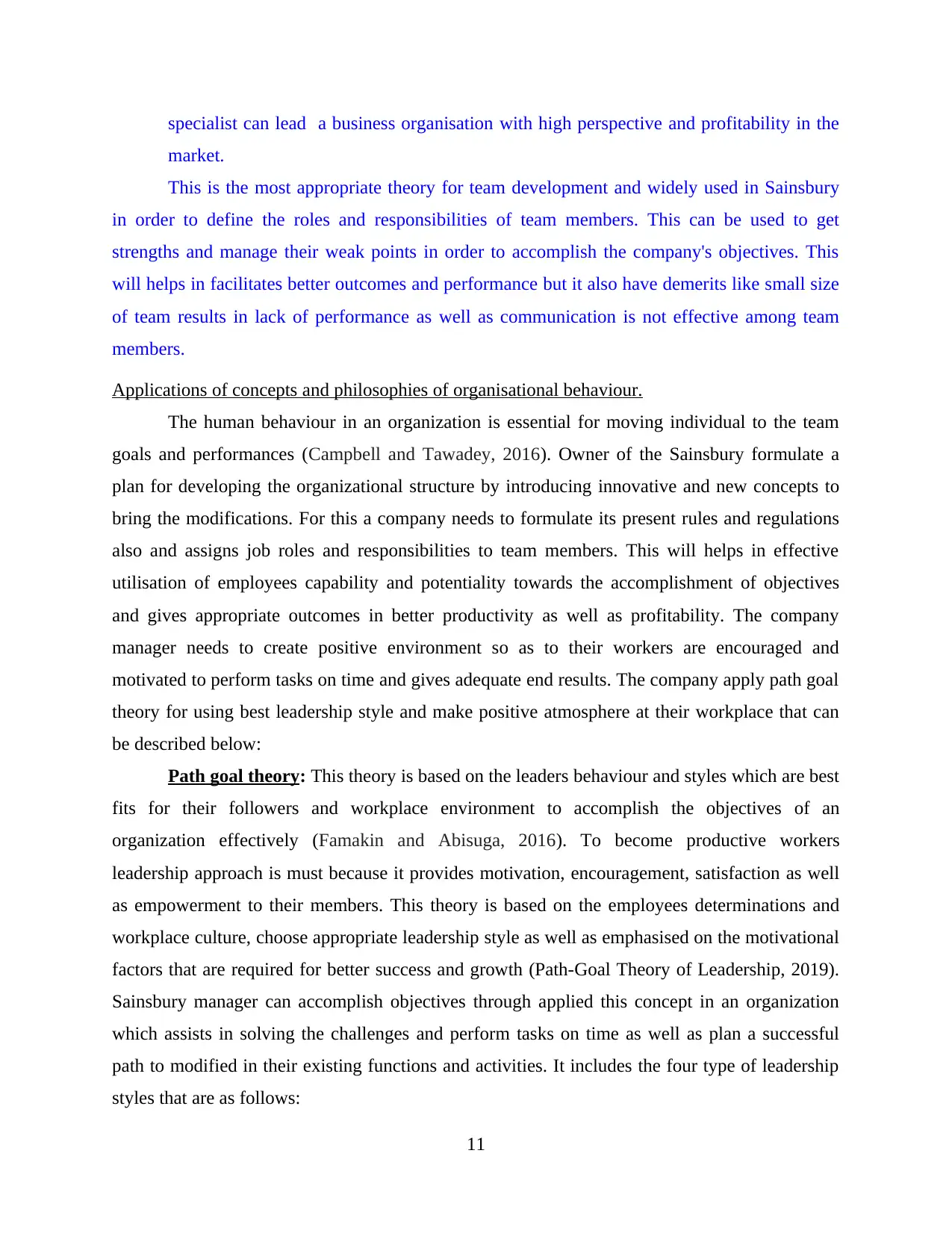
specialist can lead a business organisation with high perspective and profitability in the
market.
This is the most appropriate theory for team development and widely used in Sainsbury
in order to define the roles and responsibilities of team members. This can be used to get
strengths and manage their weak points in order to accomplish the company's objectives. This
will helps in facilitates better outcomes and performance but it also have demerits like small size
of team results in lack of performance as well as communication is not effective among team
members.
Applications of concepts and philosophies of organisational behaviour.
The human behaviour in an organization is essential for moving individual to the team
goals and performances (Campbell and Tawadey, 2016). Owner of the Sainsbury formulate a
plan for developing the organizational structure by introducing innovative and new concepts to
bring the modifications. For this a company needs to formulate its present rules and regulations
also and assigns job roles and responsibilities to team members. This will helps in effective
utilisation of employees capability and potentiality towards the accomplishment of objectives
and gives appropriate outcomes in better productivity as well as profitability. The company
manager needs to create positive environment so as to their workers are encouraged and
motivated to perform tasks on time and gives adequate end results. The company apply path goal
theory for using best leadership style and make positive atmosphere at their workplace that can
be described below:
Path goal theory: This theory is based on the leaders behaviour and styles which are best
fits for their followers and workplace environment to accomplish the objectives of an
organization effectively (Famakin and Abisuga, 2016). To become productive workers
leadership approach is must because it provides motivation, encouragement, satisfaction as well
as empowerment to their members. This theory is based on the employees determinations and
workplace culture, choose appropriate leadership style as well as emphasised on the motivational
factors that are required for better success and growth (Path-Goal Theory of Leadership, 2019).
Sainsbury manager can accomplish objectives through applied this concept in an organization
which assists in solving the challenges and perform tasks on time as well as plan a successful
path to modified in their existing functions and activities. It includes the four type of leadership
styles that are as follows:
11
market.
This is the most appropriate theory for team development and widely used in Sainsbury
in order to define the roles and responsibilities of team members. This can be used to get
strengths and manage their weak points in order to accomplish the company's objectives. This
will helps in facilitates better outcomes and performance but it also have demerits like small size
of team results in lack of performance as well as communication is not effective among team
members.
Applications of concepts and philosophies of organisational behaviour.
The human behaviour in an organization is essential for moving individual to the team
goals and performances (Campbell and Tawadey, 2016). Owner of the Sainsbury formulate a
plan for developing the organizational structure by introducing innovative and new concepts to
bring the modifications. For this a company needs to formulate its present rules and regulations
also and assigns job roles and responsibilities to team members. This will helps in effective
utilisation of employees capability and potentiality towards the accomplishment of objectives
and gives appropriate outcomes in better productivity as well as profitability. The company
manager needs to create positive environment so as to their workers are encouraged and
motivated to perform tasks on time and gives adequate end results. The company apply path goal
theory for using best leadership style and make positive atmosphere at their workplace that can
be described below:
Path goal theory: This theory is based on the leaders behaviour and styles which are best
fits for their followers and workplace environment to accomplish the objectives of an
organization effectively (Famakin and Abisuga, 2016). To become productive workers
leadership approach is must because it provides motivation, encouragement, satisfaction as well
as empowerment to their members. This theory is based on the employees determinations and
workplace culture, choose appropriate leadership style as well as emphasised on the motivational
factors that are required for better success and growth (Path-Goal Theory of Leadership, 2019).
Sainsbury manager can accomplish objectives through applied this concept in an organization
which assists in solving the challenges and perform tasks on time as well as plan a successful
path to modified in their existing functions and activities. It includes the four type of leadership
styles that are as follows:
11
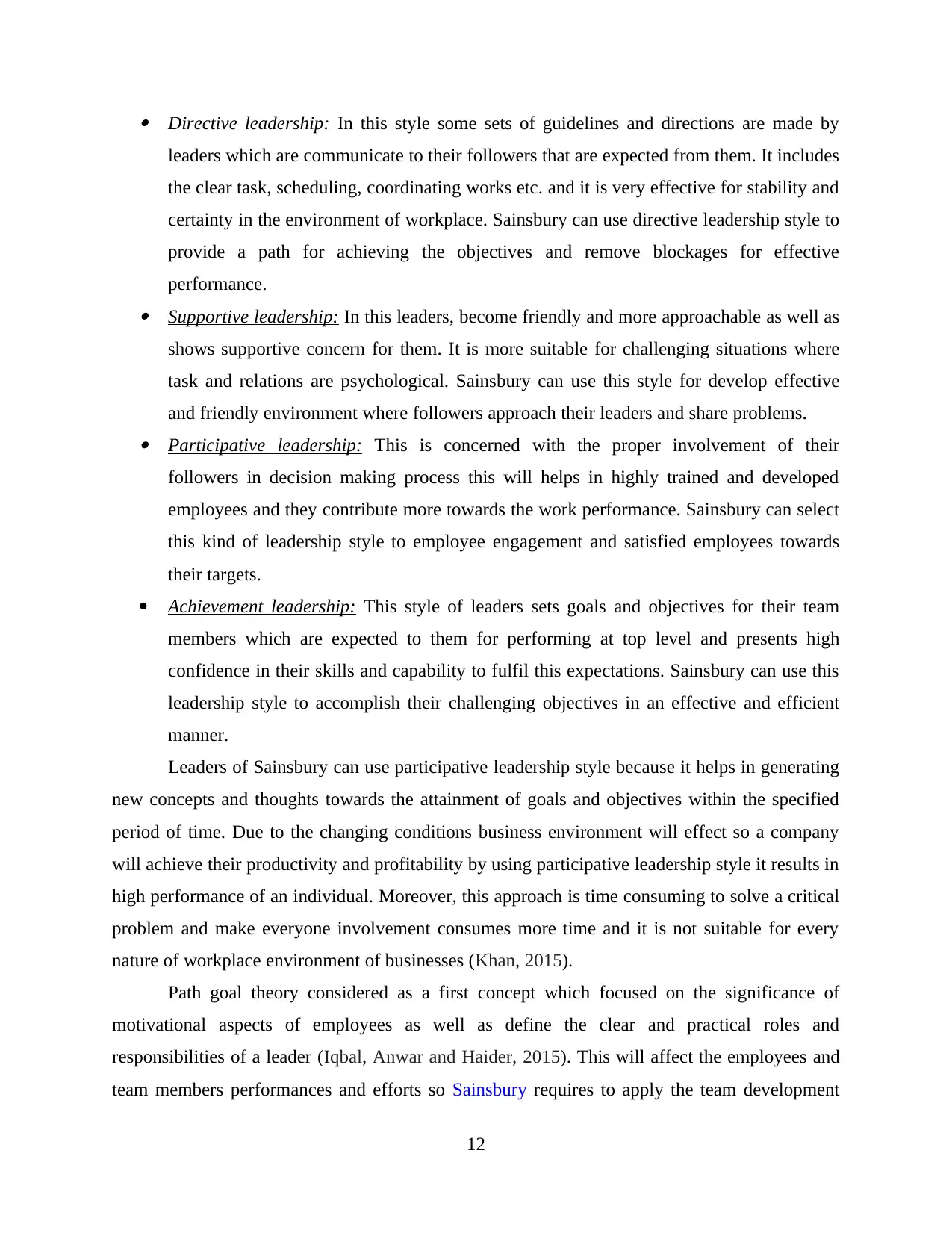
Directive leadership: In this style some sets of guidelines and directions are made by
leaders which are communicate to their followers that are expected from them. It includes
the clear task, scheduling, coordinating works etc. and it is very effective for stability and
certainty in the environment of workplace. Sainsbury can use directive leadership style to
provide a path for achieving the objectives and remove blockages for effective
performance. Supportive leadership: In this leaders, become friendly and more approachable as well as
shows supportive concern for them. It is more suitable for challenging situations where
task and relations are psychological. Sainsbury can use this style for develop effective
and friendly environment where followers approach their leaders and share problems. Participative leadership: This is concerned with the proper involvement of their
followers in decision making process this will helps in highly trained and developed
employees and they contribute more towards the work performance. Sainsbury can select
this kind of leadership style to employee engagement and satisfied employees towards
their targets.
Achievement leadership: This style of leaders sets goals and objectives for their team
members which are expected to them for performing at top level and presents high
confidence in their skills and capability to fulfil this expectations. Sainsbury can use this
leadership style to accomplish their challenging objectives in an effective and efficient
manner.
Leaders of Sainsbury can use participative leadership style because it helps in generating
new concepts and thoughts towards the attainment of goals and objectives within the specified
period of time. Due to the changing conditions business environment will effect so a company
will achieve their productivity and profitability by using participative leadership style it results in
high performance of an individual. Moreover, this approach is time consuming to solve a critical
problem and make everyone involvement consumes more time and it is not suitable for every
nature of workplace environment of businesses (Khan, 2015).
Path goal theory considered as a first concept which focused on the significance of
motivational aspects of employees as well as define the clear and practical roles and
responsibilities of a leader (Iqbal, Anwar and Haider, 2015). This will affect the employees and
team members performances and efforts so Sainsbury requires to apply the team development
12
leaders which are communicate to their followers that are expected from them. It includes
the clear task, scheduling, coordinating works etc. and it is very effective for stability and
certainty in the environment of workplace. Sainsbury can use directive leadership style to
provide a path for achieving the objectives and remove blockages for effective
performance. Supportive leadership: In this leaders, become friendly and more approachable as well as
shows supportive concern for them. It is more suitable for challenging situations where
task and relations are psychological. Sainsbury can use this style for develop effective
and friendly environment where followers approach their leaders and share problems. Participative leadership: This is concerned with the proper involvement of their
followers in decision making process this will helps in highly trained and developed
employees and they contribute more towards the work performance. Sainsbury can select
this kind of leadership style to employee engagement and satisfied employees towards
their targets.
Achievement leadership: This style of leaders sets goals and objectives for their team
members which are expected to them for performing at top level and presents high
confidence in their skills and capability to fulfil this expectations. Sainsbury can use this
leadership style to accomplish their challenging objectives in an effective and efficient
manner.
Leaders of Sainsbury can use participative leadership style because it helps in generating
new concepts and thoughts towards the attainment of goals and objectives within the specified
period of time. Due to the changing conditions business environment will effect so a company
will achieve their productivity and profitability by using participative leadership style it results in
high performance of an individual. Moreover, this approach is time consuming to solve a critical
problem and make everyone involvement consumes more time and it is not suitable for every
nature of workplace environment of businesses (Khan, 2015).
Path goal theory considered as a first concept which focused on the significance of
motivational aspects of employees as well as define the clear and practical roles and
responsibilities of a leader (Iqbal, Anwar and Haider, 2015). This will affect the employees and
team members performances and efforts so Sainsbury requires to apply the team development
12
⊘ This is a preview!⊘
Do you want full access?
Subscribe today to unlock all pages.

Trusted by 1+ million students worldwide
1 out of 14
Related Documents
Your All-in-One AI-Powered Toolkit for Academic Success.
+13062052269
info@desklib.com
Available 24*7 on WhatsApp / Email
![[object Object]](/_next/static/media/star-bottom.7253800d.svg)
Unlock your academic potential
Copyright © 2020–2026 A2Z Services. All Rights Reserved. Developed and managed by ZUCOL.





